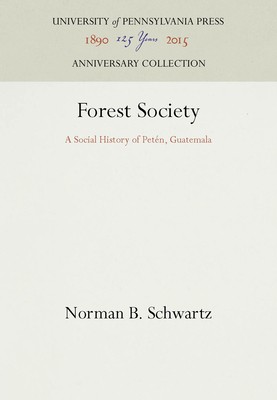
- We will send in 10–14 business days.
- Author: Norman B Schwartz
- Publisher: University of Pennsylvania Press Anniversary Collection
- ISBN-10: 0812282485
- ISBN-13: 9780812282481
- Format: 15.6 x 23.4 x 2.2 cm, hardcover
- Language: English
- SAVE -10% with code: EXTRA
Reviews
Description
In recent years, Mesoamerican anthropologists have been shifting the focus of their research from structural-functional analyses of small communities to studies of communities as the products of the interaction of microsocial and macrosocial processes. Greater attention is being given to relationships between ecology and society; between state power and local community culture; and among world economics, regional politics, and subregional sociocultural patterns. Forest Society examines the social history of Peten, in the lowlands of Northern Guatemala, in the context of these changing relationships. The author contends that, for 250 years, roughly from the 1720s to the 1970s, the sociocultural system of Peten endured with remarkable continuity, not in spite of changes in the hinterland region but, to an important degree, because of them. During that time, there was relatively little change in the socioeconomic composition of and the relationships between Peten's various social sectors and ethnic groups.
Norman B. Schwartz argues that relationships between the material base (ecology,
technology, and economy) of society in Peten demography and the struggle of individuals and groups to control resources gave Peteneros an opportunity, and, at the same time, compelled them gradually to build a stable, moderate society, marked by continuity of social status and commutative connections between ethnicity, community, and social class. He also discusses the new colonization of the 1970s and the disastrous civil war of the1980s and the reasons why these changes are finally eroding the stability of Peten's society.
Forest Society will interest scholars and students working in the fields of anthropology, history, and Latin American studies.
EXTRA 10 % discount with code: EXTRA
The promotion ends in 17d.22:48:22
The discount code is valid when purchasing from 10 €. Discounts do not stack.
- Author: Norman B Schwartz
- Publisher: University of Pennsylvania Press Anniversary Collection
- ISBN-10: 0812282485
- ISBN-13: 9780812282481
- Format: 15.6 x 23.4 x 2.2 cm, hardcover
- Language: English English
In recent years, Mesoamerican anthropologists have been shifting the focus of their research from structural-functional analyses of small communities to studies of communities as the products of the interaction of microsocial and macrosocial processes. Greater attention is being given to relationships between ecology and society; between state power and local community culture; and among world economics, regional politics, and subregional sociocultural patterns. Forest Society examines the social history of Peten, in the lowlands of Northern Guatemala, in the context of these changing relationships. The author contends that, for 250 years, roughly from the 1720s to the 1970s, the sociocultural system of Peten endured with remarkable continuity, not in spite of changes in the hinterland region but, to an important degree, because of them. During that time, there was relatively little change in the socioeconomic composition of and the relationships between Peten's various social sectors and ethnic groups.
Norman B. Schwartz argues that relationships between the material base (ecology,
technology, and economy) of society in Peten demography and the struggle of individuals and groups to control resources gave Peteneros an opportunity, and, at the same time, compelled them gradually to build a stable, moderate society, marked by continuity of social status and commutative connections between ethnicity, community, and social class. He also discusses the new colonization of the 1970s and the disastrous civil war of the1980s and the reasons why these changes are finally eroding the stability of Peten's society.
Forest Society will interest scholars and students working in the fields of anthropology, history, and Latin American studies.


Reviews